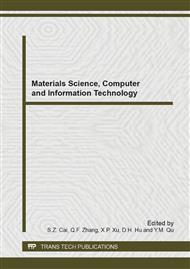p.4690
p.4694
p.4698
p.4704
p.4708
p.4713
p.4717
p.4723
p.4727
On the Process Modeling of Software Crowdsourcing Based on Competitive Relation
Abstract:
With the increase of the scale and complexity of software system software crowdsourcing development have gradually favored by the industry and scholars, to solve the large-scale, large system to develop effective solutions. In this background, this article first introduces the crowdsourcing the basic framework of the development process of software, the basic framework of crowdsourcing and then based on the software development process of put forward a comprehensive software Quality (Quality), the software task Cost (Cost) and software (Value) of a reward QCV model. Finally, this paper, by using data from the topcoder, the QCV process model is verified, it is concluded that the software quality, software cost and interaction relationship between reward.
Info:
Periodical:
Pages:
4708-4712
Citation:
Online since:
July 2014
Authors:
Keywords:
Price:
Сopyright:
© 2014 Trans Tech Publications Ltd. All Rights Reserved
Share:
Citation:


